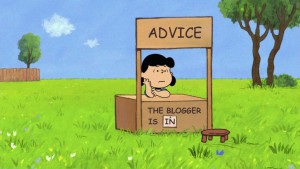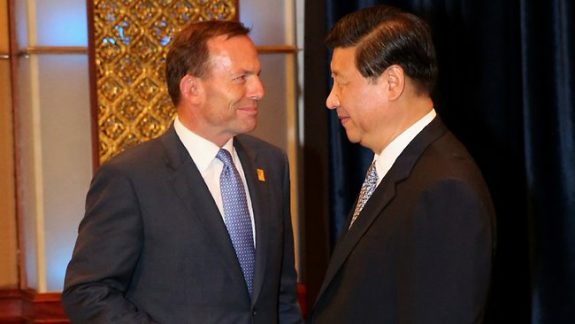Voter Directed Learning
I have never been a politician but I have always been big on giving advice. In my opinion, this government has things completely arse up and, being an experienced adviser myself, I blame their advisers.
Many politicians have few qualifications or expertise that can inform them about the intricacies of the departments that they represent. Christopher Pyne, for example, went from President of the Young Liberals to Parliament. At the age of 25, with less than two years’ work as a solicitor under his belt, he entered Federal Parliament and now, over 20 years later, he is being paid by us to make crucial decisions about education that will affect generations of children. He has chosen to ignore the expert advice from the Gonski panel because it is “too expensive”.
We hear daily how courageous our government considers itself to be, out there in the trenches “selling” the budget. That terminology really grates on me. The snake oil merchants will say anything to sell their product, as shown by how they played their own colleagues in the National Party by threatening to scrap the diesel fuel rebate to trick them into agreeing to increasing the fuel excise. How clever of them (so they think).
And I wonder who came up with the afterthought of a “medical research” slush fund to sell the co-payment. It of course has the added benefit of reducing the deficit by getting sick people to hand over $20 billion that will just sit there to make Hockey’s numbers look better. Yet this is sold to us as a way to make “medicare more sustainable”? I am sick to death of hearing “nothing is free”. Have they forgotten that we all pay a medicare levy already and were happy to increase that to pay for the NDIS, which they then try to tell us was unfunded?
So….onto my advice to this government. I think they need some voter directed learning.
Get rid of all your current advisers and stop thinking that image and spin and “selling the message” are more important than the message itself. Be advised by experts who do not have political or business conflicts of interest. Respect the knowledge and experience of public servants who have served many masters. Don’t hamstring your real negotiators in favour of dragging round a planeful of businessmen and journalists for photo opportunities.
Once you have cleared the decks of toxic influences like that odious Textor creature, start thinking about what you actually want to achieve. All I hear from this government is “get rid of debt and deficit”. That isn’t a goal. It may be the best means to achieve a goal, though that is questionable, but it is not a goal within itself. They are just numbers on a fiscal statement.
Think how we can improve our society. We need to close the gap for our Indigenous people, we need to educate our children, we need healthcare to remain universally available, we need to protect our environment, we need to keep people employed and lift people from poverty, we need to develop new industries for the future, we need to provide a safety net for those who fall on hard times, and to provide for an aging population both in care and in utilising their skills and experience, we need affordable childcare and housing and public transport. These are the things we should be striving for.
The next step is to work out how to raise the money for the programs to achieve these goals. Obviously it is preferable to increase our income rather than cutting spending. That should be investigated first. After you maximise your income you THEN look at prioritising the expenditure of that income to achieve your goals.
Stop demonising debt. It is just silly. Every successful business and individual uses debt to their advantage. Borrowing to invest in ventures that help you achieve your goals is a normal course of events. One must assess the value of the investment, the possible return it will bring, and one’s ability to service the loan.
Stop selling profitable assets to eliminate debt. The only reason someone sells a profitable business is because they want to invest the money in another more profitable venture, or they want to retire and live off the proceeds of the sale. You don’t get rid of a source of revenue to get rid of a debt. It makes no sense.
Government assets are usually sold for less than their potential value. If it is not a profitable asset then buyers pay very low prices for white elephants unless they have future potential for development. If it is a profitable business, then you can be sure that the buyer thinks they will make a greater profit which will usually be at the expense of services and jobs.
Abbott has had to admit that our economy is in good shape currently so the words crisis and emergency should not be used – they are incorrect. We do not need a fire sale.
I think everyone can see that adjustments need to be made to prepare for the future. That will always be the case in government. You cannot be so set in stone on one course of action when you are at the mercy of volatile world markets. What we need are long term goals with the ability to make short term reactions to even out the effects of changes in the global economy. We are relatively well-placed for the reaction part, but we are sadly lacking in any long term planning.
There are many reasons this budget stinks and why the sheisters are having trouble finding anyone to buy their spin. They are giving up revenue hand over fist to pander to their financial backers while hitting the poorest and most vulnerable to tighten their belts for the sake of the nation and sacrificing many long term projects that are already underway.
There are countless articles showing how billions in revenue could be easily raised, not least of which would be just cutting concessions to the rich and getting them to pay the tax they are supposed to.
Lobbyists for average Australians are being undermined at every turn. The Human Rights Commissioner for the Disabled – sacked. Countless health advisory groups and social welfare groups – disbanded. Indigenous and refugee advocacy groups – defunded. Unions – demonised.
Policies are being dictated by the mining companies, the big polluters, the gambling industry, the big banks, and the big pharmaceutical companies.
Not one of these groups has any motive other than to maximise their profits. They will only consider social cost if regulated to do so. This government is very obviously an arm of big business and is using our money to further their profits and any trivial window dressing will not hide that fact.
March on June 24. We need to remind them that we hold more votes than all their rich backers and lobbyists combined and the resources at their disposal are part of our common wealth.













